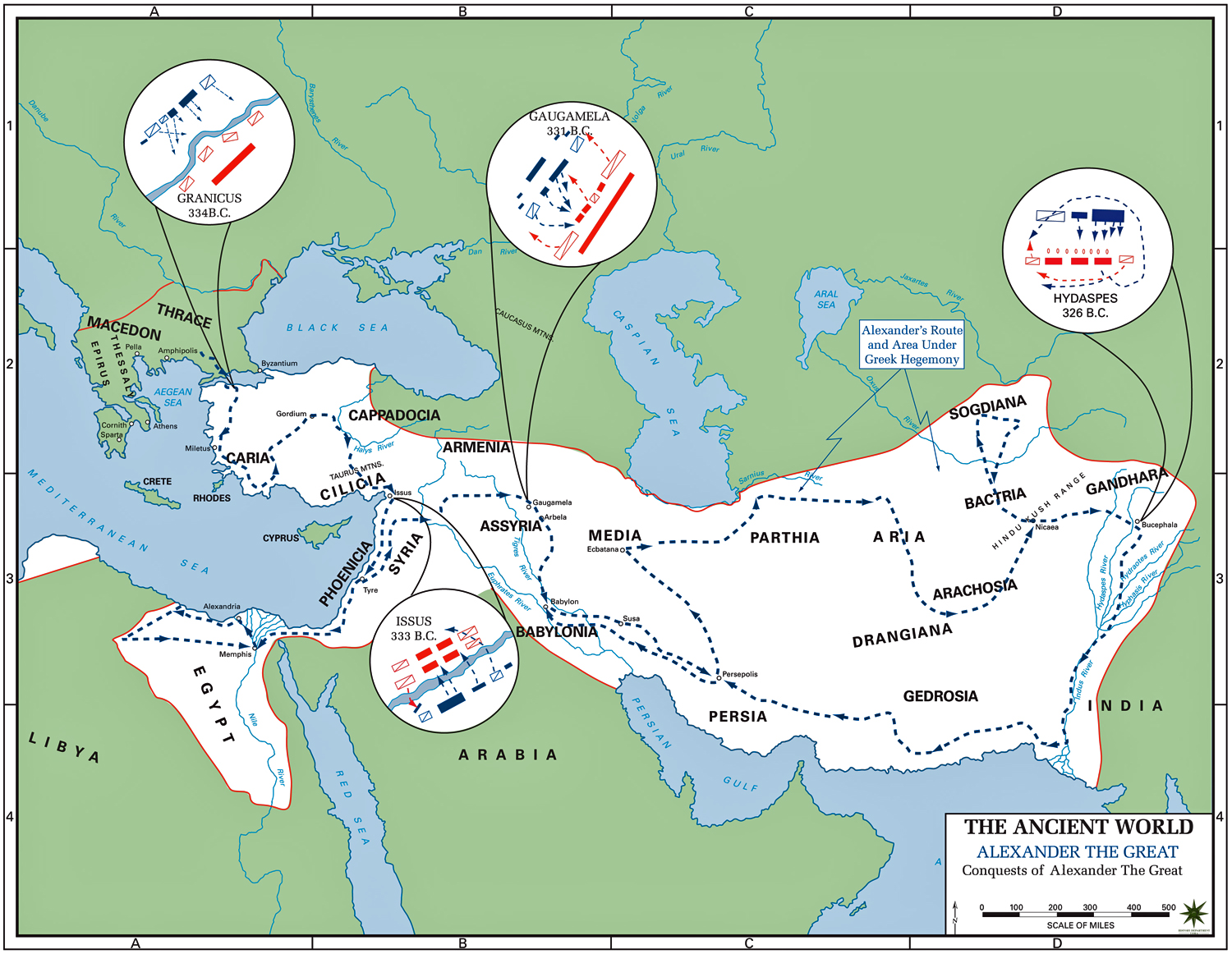The
Wars and Conquests of Alexander The Great
Alexander the Great, son of Philip of Macedon,
became the greatest conquerer of the ancient world in a
short twelve years, Alexander consolidated control over
his native Balkans in Europe, invaded and conquered the
mighty Persian Empire, subjugated the tribes of Central
Asia and Afghanistan, and invaded India. At the time of
his death, he also had plans to push his conquests into
Arabia, Rome, Carthage, and what is now known as Spain.
Alexander died at the age of 33, and his huge empire was
divided among his warring generals. Among his legacies
was the spread of Hellenistic (or Greek) culture into the
Middle East, and Egypt. Some historians see Alexander as
a civilizing force, by bringing Western (Greek) culture
to the East, while other historians, look at the huge
numbers of human deaths resulting from Alexander's wars,
and compare him to other conquerers such as Hitler.
Whether he was a precurser to Caesar, Napoleon, or
Hitler, one thing is certain; Alexander the Great did
spread Hellenic culture over an important part of the
world, and his military genius was emulated by many
conquerers and generals throughout history.
This page looks at the wars and conquests of Alexander
the Great.
Alexander's Balkan
Campaigns
Alexander of Macedon was only 19, when an
assassin named Pausanias of Orestis, killed Alexander's
father, Philip II, King of the Greek-speaking
Kingdom of Macedon. Philip had forged a powerful military
force and had conquered most of Greece and the
surrounding Balkans. Philip's contribution to military
history was not just in his son, Alexander the Great, but
also (and perhaps more importantly), his development of
the military formation known as theMacedonian Phalanx.
Based on the famed Greek (or Spartan) Phalanx, which was
the basic armed unit of Ancient Greek warfare. The
phalanx was a formation of heavy infantry which sought
out face-to-face combat with enemy formations. The
Macedonian application of the phalanx was uniquely deadly
with use of the sarissa, a very long and heavy
spear(up to 20 feet long) that had to be held with two
hands, as opposed to the earlier Spartan spear that was a
one-handed thrusting weapon. This longer and heavier
spear enabled the Macedonian phalanx to overwhelm and
destroy the lighter-armed phalanxes of the southern
Greeks. Thus, by the time of Philip's assassination in
October 336 BC, at the age of 46, he had brought most of
Greece, as well as Thrace, the region north of his native
Macedonia, under his rule. It was this nascent empire and
Philip's powerful and technologically superior veteran
military that Alexander inherited.
Upon Philip's death, several rebellions broke out in
the Greek regions he had conquered. Alexander's first
task, before launching the invasion of Persia that his
father had planned, was to crush those in rebellion to
his rule. The rebel cities included Thebes, Athens,
Thessaly, as well as the Thracian tribes to the north of
Macedon. The Greek cities surrendered quickly, and they
proclaimed him 'Hegemon' of the Greek forces against the
Persians, the title that Philip had taken in preparation
for the new Persian wars. Alexander then marched north
with his army to put down the rebellion in Thrace.
In the terrritory north of Macedon, Alexander's army
faced the forces of the Illyrians and the Triballi. He
defeated them, and then marched to the Danube River where
he defeated the Getae tribe. Alexander then marched to
the Illyrian city of Pelium, which fell to him after a
siege. With his rear now secure, Alexander could then
march south to deal with the once-again rebellious cities
of Thebes and Athens.
When Alexander entered the vicinity of Thebes and
Athens, only the Thebans voted (as these cities practiced
democracy, a Greek-invented political system whereby
decisions were made by a vote of citizens), to go to war
with Alexander to gain their freedom. Alexander's forces
assaulted the city and made their way through an
unguarded gate. After fierce street-by-street combat
inside of the city, Thebes fell to the Macedonians. The
city of Thebes was burnt to the ground, and 6,000 Thebans
died in the battle, and 30,000 civilians, men, women, and
children, were made captive and then sold into slavery.
After the Battle of Thebes, in December, of 335
BC, none of the Greek city-states dared rise in rebellion
against Alexander.
Alexander's pattern as a conquerer can be seen in how
he defeated the various rebel cities and peoples. He
ignored the advice of his generals and other advisors,
many of whom urged caution. Instead, Alexander launched
fast, heavy attacks on his foes, choosing to defeat them
through the trauma of heavy combat and shock tactics.
Cities that stood in his way, such as Thebes, were
destroyed, their populations killed or sold into slavery.
While Greek warfare of the past usually paid no mind to
killing civilians in cold blood or selling losers into
slavery, Alexander's conquests throughout Greece and Asia
would drench the land with blood. Any city, nation, or
tribe that opposed him faced utter destruction.

Map of Alexander the
Great's Conquests
Courtesy of the
United States Military Academy Department of
History

